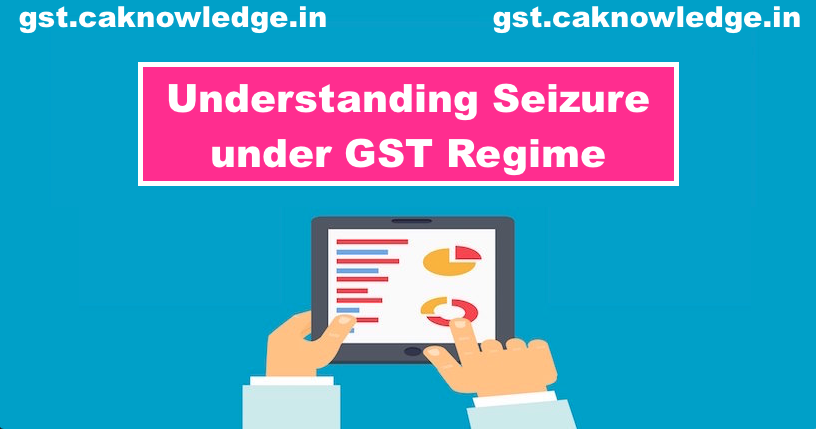Seizure is defined as taking of something by force. Section 67 of Central Goods and Services Tax Act, 2017, read with respective rules state provisions relating to Seizure under GST.For smooth implementation of GST, the Government has recently notified rates for the goods and services under the CGST Act, UTGST Act as well as IGST Act. Also, it had earlier via notifications issued under Central Goods and Services Tax Act and Integrated Goods and Services Tax Act, made some of the provisions of the GST Act effective from 22nd June, 2017. Further, in order to provide the relaxation to the industry, provisions related to return filing for the first two months of the GST implementation have been relaxed along with the postponement of the provisions relating to Tax Deduction at Source and Tax Collection at Source
Understanding Seizure under GST in Very Short with FAQ’S
The salient points of seizure are as follows:
Order of Seizure
A proper officer not below the rank of Joint Commissioner or an officer authorised by such proper officer can make an order of seizure in form GST INS-02 for cases authorised under Section 67(2)
Order of Prohibition
Where Goods or things cannot be seized, the proper officer or the authorised officer may serve on the owner or the custodian of the goods, an order of prohibition in FORM GST INS-03 that he shall not remove, part with, or otherwise deal with the goods except with the previous permission of such officer
Advertisement
Content in this Article
Preparation of Inventory
When goods are seized the officer is required to prepare an inventory of such goods or books or documents seized containing, inter alia, description, quantity or unit, make, mark or model, where applicable, and get it signed by the person from whom such goods or documents or books or things are seized.
Bond for release of seized goods
Goods seized by a proper officer or an authorised officer can be released on a provisional basis upon execution of a bond for the value of goods and furnishing of a security. The bond so executed will be in Form GST INS-04 and the security in the form of a bank guarantee equivalent to the amount of applicable tax, interest and penalty payable. In case the person to whom the goods were released provisionally fails to produce the goods at the appointed date and place indicated by the proper officer, the security shall be encashed and adjusted against the tax, interest and penalty and fine, if any, payable in respect of such goods.
Procedure in respect of seized goods
If the goods so seized are of perishable or hazardous nature, such goods can be released by an order under Form GST INS-05 only after the taxable person pays an amount equivalent to the market price of such goods or things or the amount of tax, interest and penalty that is or may become payable by the taxable person, whichever is lower and produce the proof of payment. If the taxable person doesn’t pays the amount, the Commissioner has the power to dispose of such goods or things and the amount realized thereby will be adjusted against the tax, interest, penalty, or any other amount payable in respect of such goods or things.
What is the meaning of the term Seizure?
Ans. In Law Lexicon Dictionary, seizure, is defined as the act of taking possession of property by an officer under legal process. It generally implies taking possession forcibly contrary to the wishes of the owner of the property or who has the possession and who was unwilling to part with the possession.
Who can order for search and seizure and under what circumstances?
Ans. Proper officer not below the rank of Joint Commissioner can authorize himself or any other CGST officer in writing to carry out search and seize goods, documents, books or things. Such authorization can be given only where the proper officer has reasons to believe that any goods liable to confiscation or any documents or books or things, which in his opinion shall be useful for or relevant to any proceedings under this Act, are secreted / hidden in any place
What are the safeguards provided in section 67 in respect of search and seizure?
The following are the safeguards provided in section 67 in respect of search and seizure:
- (a) Seized goods or documents should not be retained beyond the period necessary for their examination.
- (b) Photocopies of the documents can be taken by the person from whose custody documents are seized.
- (c) In respect of seized goods, if a notice is not issued within six months of its seizure, such goods shall be returned to the person from whose possession it was seized. This period of six months can be extended on justified grounds up to a further period not exceeding six months.
- (d) An inventory of seized goods shall be prepared by the seizing officer.
- (e) Certain notified categories of goods such as perishable, hazardous, depreciation in value of the goods with the passage of time etc. can be disposed of immediately after seizure.
- (f) Provisions of Code of Criminal Procedure 1973 relating to search and seizure shall apply.
Recommended Articles
- Karnataka GST Act
- GST Registration Procedure
- State GST Act
- GST Downloads
- Returns Under GST
- GST Registration
- GST Rates
- GST Forms
- HSN Code List
- GST Login
- GST Registration last date
- GST Due Dates
- GST Rules

